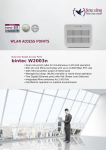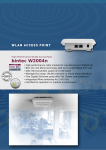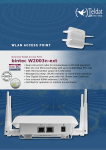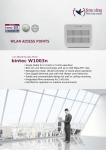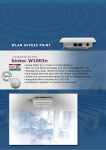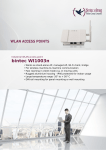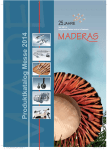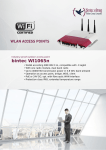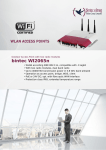Download Teldat bintec W2003n
Transcript
Business WLAN Access Point bintec W2003n • Dual concurrent radio for simultaneous 2.4/5 GHZ operation • 802.11n 2x2 Mimo technolgy with up to 2x300 Mbps PHY rate • 200 mW transmitter power at 5GHz band • Managed by integr. WLAN controller or stand-alone operation • Two Gigabit Ethernet ports with PoE (Power over Ethernet) • Integrated Mimo antennas for 2.4/5 GHz • Certified for operation in medical environments bintec W2003n Business WLAN Access Point The bintec W2003n is an 11n access point with two single-band radio modules, allowing the device to operate in both the 2.4 GHz and 5 GHz bands simultaneously. A high-performance radio module enables up to 200 mW transmission power at 5 GHz band. Product description The unit is a perfect match for indoor wireless infrastructures designed to provide access over both frequencies. Smartphones, tablets, and older notebooks can connect to the the 2.4 GHz network while high-performance notebooks connect to the 5 GHz network. Due to a high-performance radio module the W2004n works with up to 200 mW transmission power at the 5 GHz band. This is a duplication of the transmission power compared to the 2.4 GHz band. The unit is a perfect match for indoor wireless infrastructures designed to provide access over both frequencies. Smartphones, tablets, and older notebooks can connect to the the 2.4 GHz network while high-performance notebooks connect to the 5 GHz network. Due to a high-performance radio module the W2004n works with up to 200 mW transmission power at the 5 GHz band. This is a duplication of the transmission power compared to the 2.4 GHz band. You can run the bintec W2003n in any of three different modes. You can choose to operate the device as a stand-alone access point or manage it from a centrally-located bintec WLAN Controller. The W2003n can also function as a WLAN Controller itself (master access point) and manage up to six APs. The bintec WLAN Controller solution can be used in wireless networks with anywhere from 2 to 150 access points. The bintec WLAN Controller solution provides a scalable, end-to-end solution that lets you expand your network without migrating to a new technology. This flexibility protects your investments in existing infrastructures. The clean lines and elegant design of the W2003n make it an appealing choice for wall- or ceiling-mounting. It looks perfectly at home in high-end office spaces, hotels, and hospitals. Despite its handsome appearance, this access point also knows how to blend in. We've placed the antennas inside the housing, and you can turn off the LEDs to eliminate distractions. The included mounting hardware lets you quickly and easily mount the unit onto a ceiling or wall. For protection against theft, the device is also compatible with Kensington locks. As an alternative to wall-or ceiling-mounting, you can also place the device on a desktop thanks to the included rubber feet. Take advantage of all the benefits our optional bintec HotSpot solution has to offer when using the W2003n as a stand-alone access point or together with the WLAN Controller software. Hotspots benefit hotels and restaurants, for instance, by allowing them to provide controlled wireless access to their customers. The W2003n also supports handover and roaming. That means with a properly set up and surveyed wireless network managed by a bintec WLAN Controller, wireless devices enjoy Teldat GmbH - Suedwestpark 94 - 90449 Nuremberg - Germany Phone: +49 - 911 9673-0 - Telefax: +49 - 911 688 07 25 E-Mail: [email protected] - www.teldat.org bintec W2003n 29.11.2013 Subject to technical alterations Page 2 / 10 seamless coverage throughout the network. And seamless coverage is a must if you are, for instance, implementing a VoWLAN (Voice over WLAN) solution or using wireless barcode scanners for logistics applications. The W2003n gives you green IT right out of the box with its automatic energy-saving features. If no client is connected, the AP turns off any circuits not currently in use, downshifting to mimo 1x1. The Gigabit Ethernet ports support the energy-saving 802.3az standard, ensuring only as much energy as needed is used. In addition to the Access Point operation modes the device could be used as WLAN client for direct connecting of ethernet devices (e.g. printers), to connect ethernet devices with existing wireless LANs. Furthermore it is possible to use the device as bridge in Point-to-Multipoint operation mode with up to eight links. By the fact that a radio module can be used as Access Point and simultaneously as Bridgelink Master, it's easy to realize efficient Wireless Backbones. It is not possible to use a WLAN Controller at these both operating modes. Variants Teldat GmbH - Suedwestpark 94 - 90449 Nuremberg - Germany Phone: +49 - 911 9673-0 - Telefax: +49 - 911 688 07 25 E-Mail: [email protected] - www.teldat.org bintec W2003n 29.11.2013 Subject to technical alterations Page 3 / 10 bintec W2003n (5510000324) W2003n, WLAN Access Point with a dual concurrent radio module according 802.11abgn (2.4/5 GHz) Mimo 2x2, 2 Gigabit ETH, PoE, integr. Antennas, incl. wall/ceiling mounting, incl. WLAN Controller license for Master AP, shipment without 100-240V wall adapter Features Software Roaming at Client Mode No roaming, normal roaming, slow roaming, fast roaming, user defined roaming Client Management Client overload protection (to much clients) and shifting of clients to other APs, if threshold is reached. Airtime Fairness Prevent performance limitation by slower or distant clients, which block the network Client Band Select Shifting of clients to 5 GHz band Roaming Seamless roaming with IAPP (Inter Access Point Protocol), support according 802.11f Buffer pool For cushioning of peaks WMM 802.11e QoS Data prioritization for TOS data, 802.11e/WMM WMM 802.11e power save Support of active WLAN clients, which support 802.11e power save. U-APSD Unscheduled Automatic Power Save Delivery: this functionality contributes significantly to raise battery life of Voice-over-WLAN end devices Internet dialup PPPoE, PPTP (works at stand-alone operation or with WLAN controller, not at Master AP operation) NTP NTP client, NTP server, manually (works at stand-alone operation or with WLAN controller, not at Master AP operation) DNS DNS client, DNS server, DNS relay (works at stand-alone operation or with WLAN controller, not at Master AP operation) DHCP DHCP client, DHCP server, DHPC relay (DHCP Server and DHCP Relay works at stand-alone operation or together with WLAN controller, not at Master AP operation) HotSpot Requires a license. Works in WLC mode or in stand-alone operation, but not in Master-AP operation. Operation Modes WLAN operation mode Bridgelink (Point-to-multipoint) with up 8 links WLAN operation mode Transparent WLAN client to connect directly ethernet devices WLAN operation mode WLAN Access Point (Managed Access Point; Master Access Point for 6 Aps; Standalone Access Point; Standalone Access Point + Bridgelink Master) WLAN WLAN = Radio off; WLAN = Stand alone Access Point; WLAN = Managed Access Point; WLAN = Master Access Point for 6 APs Hardware Certifications Wi-Fi 802.11abgn Certified Teldat GmbH - Suedwestpark 94 - 90449 Nuremberg - Germany Phone: +49 - 911 9673-0 - Telefax: +49 - 911 688 07 25 E-Mail: [email protected] - www.teldat.org bintec W2003n 29.11.2013 Subject to technical alterations Page 4 / 10 Hardware Standards and certifications R&TTE Directive 1999/5/EG; EN 60950-1 (IEC60950); EN 300 328; EN 301 489-17; EN 301 489-1; EN 301 893; EN 60601-1-2 (medical electrical devices - Part 1-2) LAN / WAN 2 x 10/100/1000 Mbps Ethernet twisted pair, autosensing, auto MDI/MDI-X WLAN One radio module IEEE 802.11bgn Mimo 2x2 and a second high-performance radio module IEEE 802.11an Mimo 2x2 with 200 mW transmission power allow simultaneous operation at 2.4 and 5 GHz. Antenna Integrated single band Mimo antenna array with two antenna elements for each radio; 5 dBm gain @ 2,4 GHz; 6 dBm gain @ 5 GHz Real time clock Even at power loss the system time will be available for several hours. Power supply External wall power supply 230V / 9V DC, 1,3A, with high efficient switching power supply (The wall adapter is a accessory and not include the shipment). PoE Power-over-Ethernet according IEEE 802.3af, compatible with 802.3at PoE injectors Status LEDs Status, Activity for WLAN1, WLAN2 and Ethernet Wall and ceiling mounting Include the package Desktop operation Possible, rubber pad included the package Theft protection Theft protection integrated, Kensington ® compatibel Dimensions Approx. 15.9 cm x 14.5 cm x 4.3 cm (width x depth x hight) Power consumption < 8.2 Watt Environment Temperature operating: 0°C to 40°C; storage: -10°C to 70°C; rel. humidity 10 to 95% (non condensing) Wireless LAN (Radio 1) WLAN Standards 802.11b; 802.11g; 802.11n (Mimo 2x2) 2.4 GHz Receiver Sensitivity @ 2.4 GHz 1 Mbps -98 dBm; 2 Mbps -98 dBm; 5,5 Mbps -94 dBm; 11 Mbps -94 dBm; 6 Mbps -96 dBm; 9 Mbps 802.11b/g -96 dBm; 12 Mbps -95 dBm; 18 Mbps -93 dBm; 24 Mbps -90 dBm; 36 Mbps -87 dBm; 48 Mbps -83 dBm; 54 Mbps -82 dBm Receiver Sensitivity @ 2.4 GHz MSC0/8 -95 dBm; MSC1/9 -94 dBm; MCS2/10 -92 dBm; MCS3/11 -89 dBm; MCS4/12 -86 dBm; 802.11n 20 MHz MSC5/13 -82 dBm; MCS6/14 -80 dBm; MCS7/15 -78 dBm Receiver Sensitivity @ 2.4 GHz MSC0/8 -92 dBm; MSC1/9 -92 dBm; MCS2/10 -89 dBm; MCS3/11 -86 dBm; MCS4/12 -83 dBm; 802.11n 40 MHz MSC5/13 -77 dBm; MCS6/14 -76 dBm; MCS7/15 -75 dBm Tx Power @ 2.4 GHz 802.11b/g 1 Mbps 14 dBm; 2 Mbps 14 dBm; 5.5 Mbps 14 dBm; 11 Mbps 14 dBm; 6 Mbps 17 dBm; 9 Mbps 17 dBm; 12 Mbps 17 dBm; 18 Mbps 17 dBm; 24 Mbps 17 dBm; 36 Mbps 17 dBm; 48 Mbps 16 dBm; 54 Mbps 16 dBm Tx Power @ 2.4 GHz 802.11n 20 MSC0/8 16 dBm; MSC1/9 16 dBm; MCS2/10 16 dBm; MCS3/11 16 dBm; MCS4/12 16 dBm; MSC5/13 MHz 16 dBm; MCS6/14 16 dBm; MCS7/15 15 dBm Tx Power @ 2.4 GHz 802.11n 40 MSC0/8 15 dBm; MSC1/9 15 dBm; MCS2/10 15 dBm; MCS3/11 15 dBm; MCS4/12 15 dBm; MSC5/13 MHz 15 dBm; MCS6/14 15 dBm; MCS7/15 14 dBm Extended Performance Feature Beamforming, MRC (Maximum Ratio Combining), Block-Acknowlegde Teldat GmbH - Suedwestpark 94 - 90449 Nuremberg - Germany Phone: +49 - 911 9673-0 - Telefax: +49 - 911 688 07 25 E-Mail: [email protected] - www.teldat.org bintec W2003n 29.11.2013 Subject to technical alterations Page 5 / 10 Wireless LAN (Radio 1) Frequency bands 2.4 GHz 2.4 GHz Indoor/Outdoor (2412-2484 MHz) max. 100 mW EiRP (for Germany) indoor/outdoor (EU) Data rates for 802.11b,g (2.4 11, 5.5, 2 und 1 Mbps (DSSS modulation); 54, 48, 36, 24, 18, 12, 9 and 6 Mbps (OFDM modulation) GHz) Data rates for 802.11n, 20 MHz MSC0-15 allow up to 150 Mbps PHY rate at 20 MHz channel bandwidth, 2 streams, Short guard channel bandwidth intervall Data rates for 802.11n, 40 MHz MSC0-15 allow up to 300 Mbps PHY rate at 40 MHz channel bandwidth, 2 streams, Short guard channel bandwidth intervall Output power limitation ( Adjustable in following steps: 5, 8,11,14,16 dBm and maximum. Maximal power varies depending without antenna gain) on data rate, frequency band and country setting. Output power @ 2.4 GHz Max. 20dBm Automatic Rate Selection (ARS) Available Transmission rate Automatic Number of spatial streams 1 or 2 (802.11n) Bandwidth (802.11n) 20/40 MHz (bundling of two adjoining 20 MHz channels to one 40 MHz channel) Short guard interval (802.11n) On/off switchable; increase of throughput by reduction of the guard intervals from 800ns to 400ns DTIM Period Adjustable Multi SSID Up to 8 service sets per radio module, with virtual access points and own MAC address per SSID Broadcast SSID On/off switchable Power management for clients Registering of up to 250 clients per radio module simultaneously in access point mode. Default is 32 clients. Country-specific settings Channel settings according regulatory domain (802.11d) permitted RTS/CTS RTS/CTS threshold adjustable Wireless LAN (Radio 2) WLAN Standards 802.11a/h; 802.11n (Mimo 2x2) 5 GHz Receiver Sensitivity @ 5 GHz 6 Mbps -94 dBm;9 Mbps -93 dBm; 12 Mbps -92 dBm; 18 Mbps -90 dBm; 24 Mbps -88 dBm; 36 Mbps 802.11a/h -85 dBm; 48 Mbps -82 dBm; 54 Mbps -80 dBm Receiver Sensitivity @ 5 GHz MSC0 -94 dBm; MSC1 -92 dBm; MCS2 -91 dBm; MCS3 -87 dBm; MCS4 -84 dBm; MSC5 -80 dBm; 802.11n 20 MHz MCS6 -79 dBm; MCS7 -77 dBm Receiver Sensitivity @ 5 GHz MSC0 -92 dBm; MSC1 -90 dBm; MCS2 -88 dBm; MCS3 -85 dBm; MCS4 -82 dBm; MSC5 -78 dBm; 802.11n 40 MHz MCS6 -75 dBm; MCS7 -73 dBm Tx Power @ 5 GHz 802.11a/h 6 Mbps -94 dBm;9 Mbps -93 dBm; 12 Mbps -92 dBm; 18 Mbps -90 dBm; 24 Mbps -88 dBm; 36 Mbps -85 dBm; 48 Mbps -82 dBm; 54 Mbps -80 dBm Tx Power @ 5 GHz 802.11n 20 MSC0/8 15 dBm; MSC1/9 15 dBm; MCS2/10 15 dBm; MCS3/11 15 dBm; MCS4/12 15 dBm; MSC5/14 Mhz 16 dBm; MCS6/14 12 dBm; MCS7/15 10 dBm Teldat GmbH - Suedwestpark 94 - 90449 Nuremberg - Germany Phone: +49 - 911 9673-0 - Telefax: +49 - 911 688 07 25 E-Mail: [email protected] - www.teldat.org bintec W2003n 29.11.2013 Subject to technical alterations Page 6 / 10 Wireless LAN (Radio 2) Tx Power @ 5 GHz 802.11n 40 MSC0/8 14 dBm; MSC1/9 14 dBm; MCS2/10 14 dBm; MCS3/11 14 dBm; MCS4/12 14 dBm; MSC5/14 Mhz 13 dBm; MCS6/14 11 dBm; MCS7/15 9 dBm Frequency bands 5 GHz indoor 5 GHz indoor (5150-5350 MHz) max. 200 mW EiRP allowed. This information is related to the (EU) permitted transmission power in Germany. The permitted transmission power may vary in other countries. Frequency bands 5 GHz outdoor 5 GHz outdoor (5470-5725 MHz) max. 1000 mW EiRP allowed. This information is related to the (EU) permitted transmission power in Germany. The permitted transmission power may vary in other countries. Data rates for 802.11a,h (5 GHz) 54, 48, 36, 24, 18, 12, 9 and 6 Mbps (OFDM modulation) Data rates for 802.11n, 20 MHz MSC0-15 allow up to 150 Mbps PHY rate at 20 MHz channel bandwidth, 2 streams, Short guard channel bandwidth intervall Data rates for 802.11n, 40 MHz MSC0-15 allow up to 300 Mbps PHY rate at 40 MHz channel bandwidth, 2 streams, Short guard channel bandwidth intervall Receiver Sensitivity @ 5 GHz 6 Mbps -95 dBm;9 Mbps -94 dBm; 12 Mbps -93 dBm; 18 Mbps -90 dBm; 24 Mbps -88 dBm; 36 Mbps 802.11a/h -84 dBm; 48 Mbps -82 dBm; 54 Mbps -81 dBm Receiver Sensitivity @ 5 GHz MSC0/8 -94 dBm; MSC1/9 -92 dBm; MCS2/10 -90 dBm; MCS3/11 -87 dBm; MCS4/12 -84 dBm; 802.11n 20 MHz MSC5/13 -79 dBm; MCS6/14 -78 dBm; MCS7/15 -76 dBm Receiver Sensitivity @ 5 GHz MSC0/8 -92 dBm; MSC1/9 -90 dBm; MCS2/10 -87 dBm; MCS3/11 -84 dBm; MCS4/12 -80 dBm; 802.11n 40 MHz MSC5/13 -76 dBm; MCS6/14 -74 dBm; MCS7/15 -72 dBm Output power limitation ( Adjustable in following steps: 5, 8,11,14,16 dBm and maximum. Maximal power varies depending without antenna gain) on data rate, frequency band and country setting. Output power @ 5 GHz Max. 23 dBm (200mW EiRP) Automatic Rate Selection (ARS) Available Transmission rate Automatic Number of spatial streams 1 or 2 (802.11n) Bandwidth (802.11n) 20/40 MHz (bundling of two adjoining 20 MHz channels to one 40 MHz channel) Short guard interval (802.11n) On/off switchable; increase of throughput by reduction of the guard intervals from 800ns to 400ns DTIM Period Adjustable Extended Performance Feature Beamforming, MRC (Maximum Ratio Combining), Block-Acknowlegde Multi SSID Up to 8 service sets per radio module, with virtual access points and own MAC address per SSID. Broadcast SSID On/off switchable Power management for clients Registering of up to 250 clients per radio module simultaneously in access point mode. Default is 32 clients. Country-specific settings Channel settings according regulatory domain (802.11d) permitted. RTS/CTS RTS/CTS threshold adjustable Security Teldat GmbH - Suedwestpark 94 - 90449 Nuremberg - Germany Phone: +49 - 911 9673-0 - Telefax: +49 - 911 688 07 25 E-Mail: [email protected] - www.teldat.org bintec W2003n 29.11.2013 Subject to technical alterations Page 7 / 10 Security Encryption WEP/WPA WEP64 (40 Bit key), WEP128 (104 Bit key), WPA personal, WPA enterprise, WPA2 personal, WPA2 enterprise IEEE802.11i authentication and 802.1x/EAP-MD5, 802.1x/EAP-TLS, 802.1x/EAP-TTLS, 802.1x/EAP-PEAP, key management, PSK/TKIP encryption encryption, AES encryption, 802.1x/EAP Access control list (ACL) MAC address filter for WLAN clients (white list) and dynamic and static blacklist. Black list function requires WLAN Controller WIDS (Wireless Intrution Rogue AP detection: detect foreign Aps, which try to spy out data via SSIDs by permanent Detection System) background scanning. This functionality requires WLAN Controller. WIDS (Wireless Intrution Rogue Client Detection: detection and protection: detect conspicuous clients, which try to intrude Detection System) or interfere the wireless network.In threat case blocking by dynamic black list. This functionality requires WLAN Controller. WIDS (Wireless Intrution Neighbor AP Detection: detection of neighbor Aps with possible influence on performance of own Detection System) network. By detected intrusion: SNMP trap or email alert. This functionality requires WLAN Controller. VLAN Network segments on layer2 possible. Per SSID one VLAN ID available. Static VLAN configuration according IEEE 802.1q; up to 32 VLANs supported. Inter cell repeating Inter traffic blocking for public HotSpot (PHS) applications for preventing of communication radio client to radio client in a single radio cell. NAT/PAT Network & Port Address Translation / Stateful Packet Inspection: Isolation of complete network from public access Energy Savining Functions Mimo 1x1 shift down The radio modules switching automatic to Mimo 1x1 operation, when no client is connected 802.3az support The ethernet interfaces reduce the power consumption automatically, in case that no device is connected. In the case of the usage of a short ethernet cable, the circuit reduce the transmit power. LED Mode The LEDs has three operation mode: Status, Flashing, Off Maintenance Configuration a. maintenance: Configuration a. maintenance: Telnet, SSH, HTTP, HTTPS, SNMP Device configuration via Configuration a. maintenance: SNMP (v1, v2, v3), USM model, VACM views, SNMP traps (v1, v2, v3) configurable, SNMP IP access SNMP list configurable Configuration a. maintenance: Complete management with MIB-II, MIB 802.11, enterprise MIB SNMP configuration Configuration a. maintenance: Supports SSH V1.5 and SSH V2.0, for secure connections of terminal applications SSH Login Configuration a. maintenance: Web-based configuration (FCI). The user interface is identical with almost all bintec elmeg HTTP/HTTPS products. Teldat GmbH - Suedwestpark 94 - 90449 Nuremberg - Germany Phone: +49 - 911 9673-0 - Telefax: +49 - 911 688 07 25 E-Mail: [email protected] - www.teldat.org bintec W2003n 29.11.2013 Subject to technical alterations Page 8 / 10 Maintenance Configuration a. maintenance: SSH available, HTTPS, Telnet protected against 'bruce force attacks' Secure configuration Configuration a. maintenance: Load and save of configurations; save configuration optionally encrypted; optional, automatic Configuration export and import controlled via scheduler Configuration a. maintenance: No restart is required after the configuration has been changed. On the fly configuration Configuration a. maintenance: Software updates free of charge; loadable via file, HTTP or via direct access to the bintec elmeg Software update upload server; optional, automatic controlled via scheduler External Reporting: External reporting: Syslog Syslog client, with different levels of messaging External reporting: eMail alert Automatic eMail alert by definable events (predefined events: new neighbor AP found, new rogue AP found, new slave AP found, managed AP failed) External reporting: SNMP traps Supported Monitoring: Monitoring: Internal Log Output via web-based configuration interface (http/https); filter: subsystem, level, message Monitoring: Interfaces Statistic information of all physical and logical interfaces Monitoring: WLAN Detailed displays for radio, VSS. Displayed are per link: MAC address, IP address, TX packets, RX packets, signal strength for every receiving aerial, signal-to-noise ratio, data rate Monitoring: Configurable In the operation mode 'standalone AP' the following events can be scheduled: Reboot device, scheduler (standalone AP) activate/deactivate interface, activate/deactivate WLAN SSID, initiate 5 GHz band scan, trigger SW update, trigger configuration backup Monitoring: Configurable In the operation mode 'WLAN Controller' the following events can be scheduled: scheduler (WLAN Controller) Activate/deactivate WLAN SSID, initiate Neighbor band scan Management: Supported WLAN Controller, DIME Manager, XAdmin management systems Management: Discovery Protocol CAPWAP DHCP option according RFC1517 Management: WLAN Controller Can act as stand-alone AP without WLAN controller; can act for small installation with up to 6 AP as functionallity WTP-AC (Master AP); can act as WTP (Managed by a WLAN Controller) Documentation German and English documentation on CD and in the Internet for download Guarantee 2-year manufacturer's guarantee, online RMA handling Accessoires Access Points and Bridges WLAN-Bundle 6xW2003n (5510000350) WLAN Bundle contains 6 Access Points bintec W2003n (5510000324) WLAN-Contr.-Bundle 10xW2003n WLAN Controller Bundle contains 10 Access Points bintec W2003n (5510000324) , (5510000352) 1 bintec R1202 (5510000210) and 2 WLAN Controller licences (5500000943) Teldat GmbH - Suedwestpark 94 - 90449 Nuremberg - Germany Phone: +49 - 911 9673-0 - Telefax: +49 - 911 688 07 25 E-Mail: [email protected] - www.teldat.org bintec W2003n 29.11.2013 Subject to technical alterations Page 9 / 10 Pick-up Service / Warranty Extension Service Package 'small' (5500000810) Warranty extension of 3 years to a total of 5 years, including advanced replacement for Teldat products of the category 'small'. Please find a detailed description as well as an overview of the categories on www.teldat.de/servicepackages. Add-ons PS-EURO-Wx003n/Wx004n (5500001254) Wall power supply with EU-plug for W1003n, W2003n, W2003n-ext, W2004n Wall mounting for Wx003n/4n (5500001278) Wall and ceiling mounting (spare part) for W1003n, W2003n, W2003n-ext, W2004n Gigabit PoE Injector (5530000082) PoE Injector for LAN 10/100/1000 Mbps, 100-240V, EU plug, output 48V/0.35A; suitable for Access Points, IP phones, etc. Teldat GmbH - Suedwestpark 94 - 90449 Nuremberg - Germany Phone: +49 - 911 9673-0 - Telefax: +49 - 911 688 07 25 E-Mail: [email protected] - www.teldat.org bintec W2003n 29.11.2013 Subject to technical alterations Page 10 / 10










